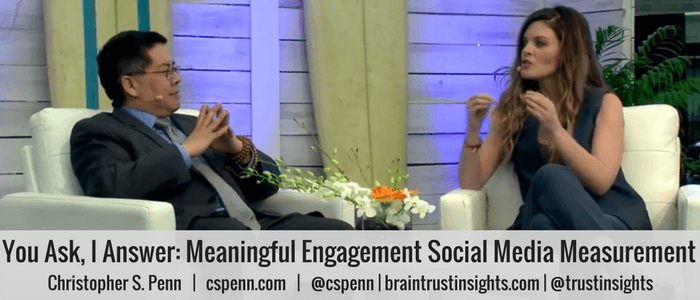Tony Dunn asked,
What are some unique tips, scripts or tools to measure “meaningful interactions”, vs using typical engagement metrics like impressions, clicks, likes, etc? (beyond counting replies or comments)
This is partly in reference to Facebook’s algorithm change, but also speaks to a much deeper measurement issue lurking within social media. The answer? Use a tool like Watson Analytics to find out. Watch this short video for more details:
Got a question for You Ask, I Answer? Submit it here.
Transcript
I think in this particular instance is sort of code for how Facebook is trying to determine what’s in the News Feed, and we know algorithmically that any kind of interaction is important.
So in a lot of ways, Facebook gives you that data already, for your brand page and in some of the monitoring tools they own. Facebook purchased a tool about a year ago called CrowdTangle, which is one of my personal favorites. It’s free of financial cost now but there’s a multi year waiting list to get in, so apply sooner rather than later. However for these meaningful interactions, Facebook says what it is for their particular algorithm .
What I would do is if you have a really good social media monitoring software package, that has the ability to infer estimated reach, run a correlation matrix between the performance of a post versus all the variables there in your brand page, and then ideally competitors data.
Running a correlation matrix will help you understand that these are the variables that seemed to be the most associated with the desired outcome, which is the interactions, versus the variables that don’t seem to matter a whole lot. If you want to get super fancy there are ways like Markov chains to do that from a machine learning perspective, but for the average social media marketer or digital marketer I would do a correlation matrix.
That’s something you could do in the free open source software R programming language; you could even do very simple correlations right inside of Microsoft Excel spreadsheets. You have your column of all the different variables and then just run a standard correlation function in the top row of each column to the desired target, which is like your overall interactions, and see again which which one of those columns seems to be most closely associated.
The third tool that I think is a really good one for this application – it’s not free – it’s a tool called IBM Watson Analytics, and there again, you take that spreadsheet of all my social data for that I get out of my Facebook page. You specify a target. You say, I want to know what predicts interactions or what predicts engagement and what Watson Analytics will do is a multivariate analysis and say this this combination of variables seems to best fit a prediction on on meaningful interactions if you can define it within your spreadsheet.
I think for the average social media marketer that’s the best tool because there’s really no coding involved. It’s assembling the spreadsheet and then asking – literally typing to Watson – what drives engagements?
While I think that’d be a great choice for predicting that, at a bigger picture level, I would not stay within the social network’s data; I would also blend in Google Analytics data. So if we’re talking about Facebook impressions, clicks, likes, video views, et cetera., I would then take website traffic to my website from Facebook, I would take conversions or goal completions from Facebook as a source, and I put all that in there, too, and then use like a tool like Watson Analytics to say, tell me what results in conversions from Facebook.
Because that’s really what I am after – engagement’s important in terms of of beating the algorithm, if you will, but the real gold is in getting an actual business result. I would incorporate the Google Analytics data as well, and that might even give you a deeper insight into the Facebook metrics themselves, because what generates interactions may not generate conversions.
You have to play a balancing act between those two very different goals. The goal of Facebook has commanded of us all, and the goal that actually matters to us all that turns into business. So, Tony, hopefully, that gives you three sets of ideas that you can use for measuring these meaningful interactions.
You might also enjoy:
- Almost Timely News, January 14, 2024: The Future of Generative AI is Open
- Almost Timely News: Recipes vs. Principles in Generative AI (2024-03-03)
- Almost Timely News, February 4, 2024: What AI Has Made Scarce
- Mind Readings: You Need Passwords for Life in the Age of Generative AI Fraud
- Almost Timely News, Febuary 18, 2024: From Comment to Content
Want to read more like this from Christopher Penn? Get updates here:
 Take my Generative AI for Marketers course! |



Leave a Reply